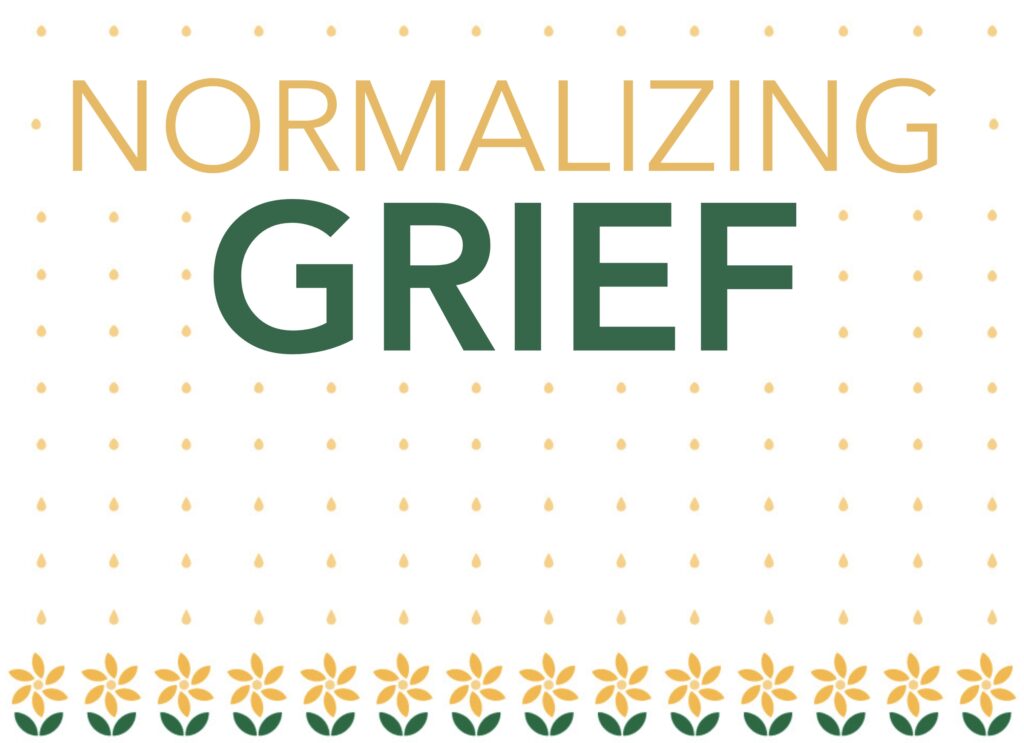
When we think of grief, we almost always associate it with death. But the truth is, grief has many forms.
You can grieve the loss of a relationship, in the case of a romantic break-up or a platonic falling out. You can grieve an old home as you get settled into a new one. You can grieve for yourself if you’re feeling depressed or not yourself.
You can grieve so many things, for so many reasons — there is no one-size-fits-all definition of grief. Grief impacts all of us in its own way.
Stages of Grief
While it’s helpful to name the various stages of grief, the truth is that grief is not typically linear, and these stages are not set in stone.
Grief is very fluid, with each individual experiencing it in their own unique way. There is no certain time frame or protocol that applies to everyone — grief is as unique as each person going through it.
While it can be helpful to name feelings, many people don’t experience all the stages of grief, or they experience one much longer than others, or they go through the same feeling twice. That said, here are the common stages of grief:
- Denial
- Anger
- Bargaining
- Depression
- Acceptance
Have you ever experienced the ways in which naming your feelings can help you process and understand them?
Accepting Grief
Welcoming grief is an important step in the healing process. Grief allows us the space and time to feel our emotions deeply, and really sit with them instead of burying or shrugging them off. Grief is good because it helps us grow and heal.
Coping Strategies
Coping with grief is a deeply personal journey, but there are some strategies that may help.
- Seek support: Lean on friends, family, or a therapist for emotional support.
- Express yourself: Talk about your feelings, write in a journal, or express yourself through art or music.
- Take care of yourself: Ensure you’re eating well, exercising, and getting enough rest.
- Accept your feelings: Allow yourself to feel the range of emotions that come with grief, without judgment.
- Stay connected: Stay connected with others who understand your loss, whether through support groups or online communities.
- Find purpose: Engage in activities that bring you joy or purpose, whether it’s volunteering or pursuing a hobby.
- Seek professional help: If you’re struggling to cope, consider seeking help from a counselor. Email Support@kennedycounselingcollective.com to find the right fit for you.
Grief and Spirituality
Grief and spirituality often go hand in hand, supporting one another. Grief often leads people to deepen their spirituality, though it may also have the opposite effect, causing individuals to question the higher power they believe in, especially when a loss leaves us with questions.
If it feels right for you, spirituality can provide solace by giving something to believe in greater than life as we know it, allowing people to feel connected with their deceased loved ones, and providing a sense of community through tough times.
Spirituality looks different for everyone, just like grief. While some people may turn to it, and others may turn away from it, there is no right or wrong path when it comes to processing grief — there is only what works for each individual.
Grief in Children and Adolescents
It goes without saying that kids and adolescents generally present grief a bit differently than adults.
Grief can encompass a wide range of feelings following anything experienced as a loss, from the death of a family member (including pets – yes, even the goldfish), to the end of a friendship (even when you know they’ll start talking again in a week).
Dealing with a death can bring up the most complex of feelings over time for everyone affected, especially for the youngest loved ones. Kids and teens are starting to understand the finality of death, so they may ask a lot of questions about details surrounding the death. They may become scared of death and illness. They may want to talk to their peers more than their family and also may feel self-conscious around peers who haven’t suffered a loss like them.
As protective adults, we often shy away from talking about death to spare our children, but that can leave them confused or feeling alone. If grief is “unresolved”, or not processed, it could show up in seemingly unrelated behaviors, a trauma response, or even symptoms later in life.
Here are some best practices for nurturing a child through the loss of a loved one:
- Don’t be afraid to show your own sadness, but lean on other adults for support
- Use direct language (i.e., died) instead of euphemisms (i.e., passed away)
- Expect lots of questions (or none!)
- Create a ritual or way of honoring the loved one
- Read age-appropriate books about loss to help them process their feelings
- Play or family therapy to process complex emotions
Moving Forward
Moving forward from mourning is rarely easy. In fact, often the ‘easier’ it is the more likely it may be to come back up later.
When it comes to mourning, take your time. Know that there is no rush, and give your emotions the space to play out. Just take care of yourself in the meantime. And when you’re ready, moving forward may begin to unfold on its own. For others, it takes more of an active effort.
A few ways to facilitate moving forward include reaching out to loved ones, planning social activities, and re-igniting your passion for life through hobbies, travel, and other joy-bringing activities.
Grief, and moving forward, are not linear. Sometimes we take two steps forward and one step back, other times we do loop-dee-loos like a big, wild roller-coaster. For some, moving forward can feel like climbing a mountain, while for others it may feel like finally descending from the summit. Whatever your path, honor it with validation, patience, and self-love.
If you’d like some support in moving forward, we’re here for you. Email Support@KennedyCounselingCollective.com
Normalizing Grief
Grief is a natural, unavoidable part of life, which deserves to be embraced and normalized.
Here’s some good content that’s been helping to normalize grief through mainstream media:
- Good Grief (a new heartfelt comedy movie on Netflix)
- Grief as Love (a book about living with loss)
- We Who Grieve (a book about understanding our most painful emotion)
- Dead to Me (a Netflix dark but lighthearted comedy series)
- Griefcast (a podcast that explores grief with a touch of comedy)
- The Invisible String (children’s book on always being connected to loved ones)
